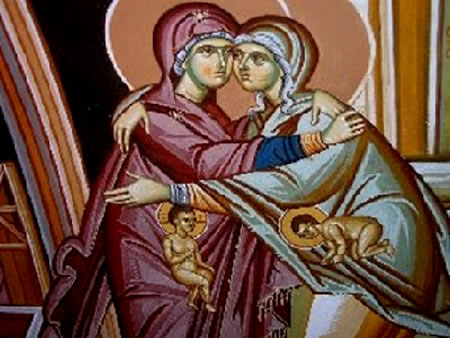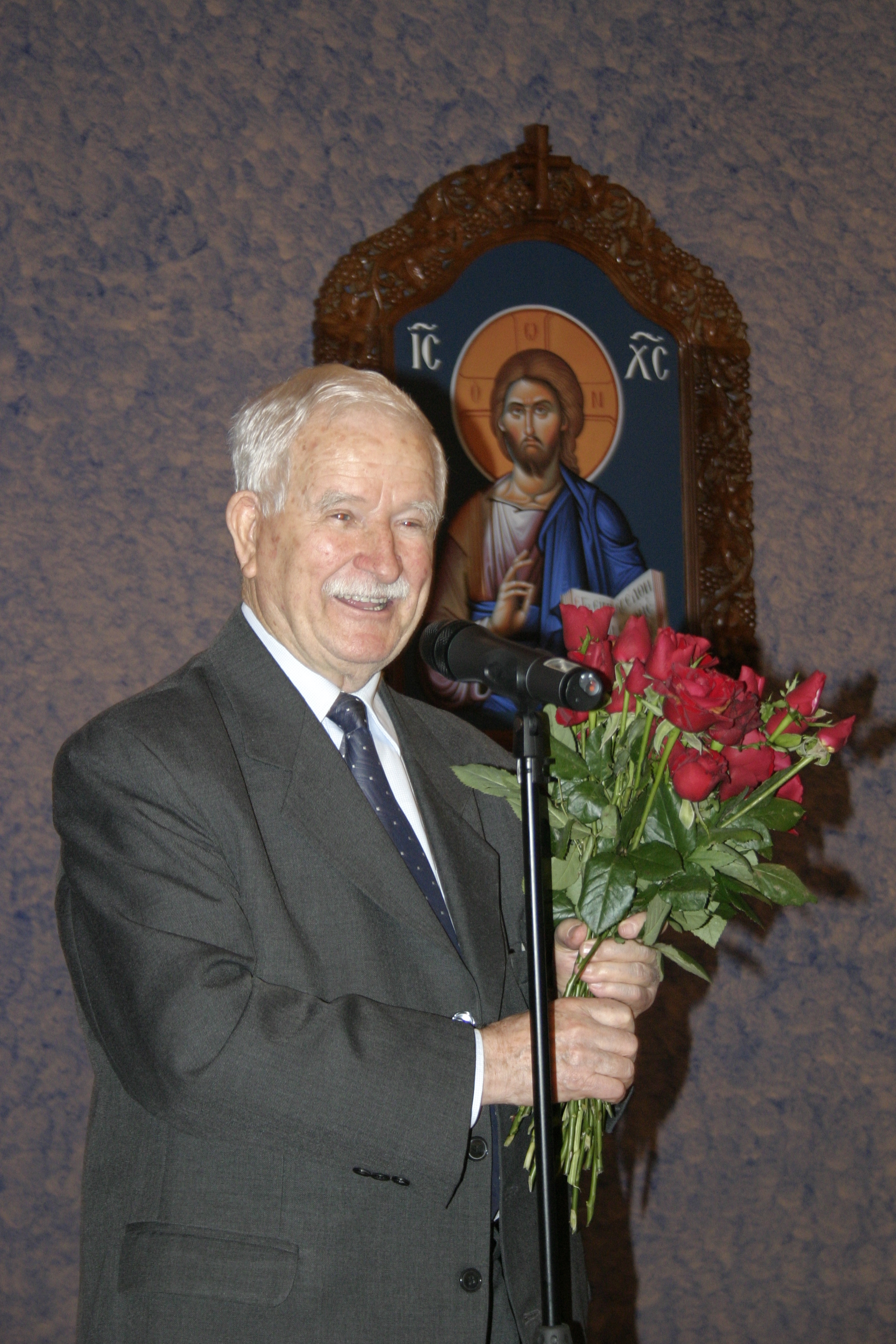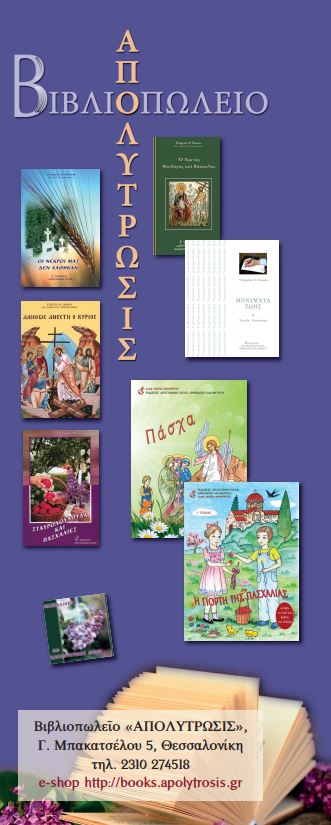Translation from the book:
Στεργίου Ν. Σάκκου, Ἑρμηνεία στό κατά Λουκᾶν Εὐαγγέλιο, τόμ. Α΄,
ἐκδ. «ΧΡΙΣΤΙΑΝΙΚΗ ΕΛΠΙΣ» ΟΡΘΟΔΟΞΗ ΑΔΕΛΦΟΤΗΤΑ, Θεσ/νίκη 2008, σσ. 62-74
(Stergios N. Sakkos [Read CV], A Commentary on the Gospel according to St. Luke, vol. A', pp. 62-74)
During the Annunciation the angel informed the Virgin that her relative, Elizabeth, was pregnant. Young Mary perceived this information as an indirect encouragement and decided to visit Elizabeth. The Holy Spirit urged her to make this visit, so that after what happened there, her faith would grow even stronger.
1,39. Ἀναστᾶσα δὲ Μαριὰμ ἐν ταῖς ἡμέραις ταύταις ἐπορεύθη εἰς τὴν ὀρεινὴν μετὰ σπουδῆς εἰς πόλιν Ἰούδα.
1:39 And Mary rose up in those days and went into the hill country in haste, to a town of Juda.
“In haste”, means urgently. This is how Mary left Nazareth, which was in the south of Galilee, and went to a town in the mountainous Judea. She attempted to make such a long, tiring journey not only for a girl but for men as well. She probably followed a group of fellow travelers, friends or relatives. Maybe it was during Passover, as it is supported by many Church Fathers, when all Israelis travelled to Jerusalem. Therefore, virgin Mary did not have any difficulty in finding fellow travelers for her journey.
1,40-41. καὶ εἰσῆλθεν εἰς τὸν οἶκον Ζαχαρίου καὶ ἠσπάσατο τὴν Ἐλισάβετ. Καὶ ἐγένετο ὡς ἤκουσεν ἡ Ἐλισάβετ τὸν ἀσπασμὸν τῆς Μαρίας, ἐσκίρτησε τὸ βρέφος ἐν τῇ κοιλίᾳ αὐτῆς· καὶ ἐπλήσθη Πνεύματος ἁγίου ἡ Ἐλισάβετ.
1:40-41 And she entered the house of Zechariah, and greeted Elizabeth. And as soon as Elizabeth heard Mary’s greeting, the baby leaped in her womb; and Elizabeth was filled with the Holy Spirit.
 A “Greeting” can be verbal or it can be a handshake or a kiss and embrace. In this case Mary “greeted”, addressed a verbal greeting, which Elizabeth heard. She greeted either with the Greek “Rejoice” or with one of the judaic greetings “Peace be with you” (Judg 19:20) or “The Lord bless you” (Ruth 2:4).
A “Greeting” can be verbal or it can be a handshake or a kiss and embrace. In this case Mary “greeted”, addressed a verbal greeting, which Elizabeth heard. She greeted either with the Greek “Rejoice” or with one of the judaic greetings “Peace be with you” (Judg 19:20) or “The Lord bless you” (Ruth 2:4).
The moment Elizabeth heard her young relative’s greeting and without knowing anything else, she felt the baby moving inside her: “the baby leaped in her womb”. This was not a normal movement of the embryo. Something similar happened to Rebecca but she could not understand what the movements of her embryos meant (see Gen 25:22). Elizabeth, however, “was filled with the Holy Spirit” (cf. verse 15), she was enlightened by the Holy Spirit and she felt this movement as a kind of exultation. Virgin Mary’s meeting with Elizabeth is chanted, in the fifth stanza of the first Stasis of the Akathist Hymn: “The Virgin, bearing God in her womb, hastened to visit Elizabeth, whose own babe at once knowing her greeting, rejoiced and leaping up as if in a song, cried out to the Theotokos”.
1,42. καὶ ἀνεφώνησε φωνῇ μεγάλῃ καὶ εἶπεν· εὐλογημένη σὺ ἐν γυναιξὶ καὶ εὐλογημένος ὁ καρπὸς τῆς κοιλίας σου.
1:42 And she exclaimed with a loud voice, and said, blessed are you among women, and blessed is the fruit of your womb.
The seemingly superfluous repetition of the synonyms “exclaimed” and “a loud voice” expresses emphatically what Elizabeth experienced when she recognized Mary’s grandeur. She was absolutely certain of her divine pregnancy being a fact. Her cry of joy was mixed with awe. Elizabeth’s greeting to virgin Mary was the same with that of the angel: “Blessed are you among women”. It is not a wish to “be blessed” but rather she expressed her conviction that she’s already blessed.
The phrase “and blessed is the fruit of your womb” which is an addition to the angel’s greeting, shows that Elizabeth knew about Mary’s pregnancy by divine revelation. As it was already mentioned, Mary conceived the fruit of her womb the moment she freely consented to God’s plan (see verse 38).
The Church, combining the angel’s greeting with that of Elizabeth’s to Mary, composed one of the finest hymns which is included in the Vesper service of the Lent and in the Artoklasia (The Blessing of the Five Loaves): “Hail, most blessed Mary, Virgin Theotokos, the Lord is with you. Blessed are you among women, and blessed is the fruit of your womb, for you have given birth to the Savior of our souls”.
1,43. Καὶ πόθεν μοι τοῦτο ἵνα ἔλθῃ ἡ μήτηρ τοῦ Κυρίου μου πρός με;
1:43 And how did this happen to me, that the mother of my Lord should come to me?
“And how did this happen to me” expresses the awe Elizabeth felt. She wondered if she had some value or virtue that proved her worthy of such an honourable visit. She knew that the person who came to her house was not a common woman, a simple relative, but the Lord’s mother. Elizabeth called her “mother”, since she was already expecting a baby. Elizabeth respected and venerated her, even though she was older than her, because she realized that virgin Mary would be her Lord’s mother. She would never call Mary “the mother of my Lord” on her own, because only God is the Lord for the Jewish people. The Holy Spirit revealed to her (verse 15), that the expected baby is the God and urged her to this declaration. The way Elizabeth addressed Mary is a testimony that the divine and human nature were both united substantially in Jesus since the moment of conception. The pronoun “my” shows Elizabeth’s intimacy with the God she believed.
1,44. Ἰδοὺ γὰρ ὡς ἐγένετο ἡ φωνὴ τοῦ ἀσπασμοῦ σου εἰς τὰ ὦτά μου, ἐσκίρτησε τὸ βρέφος ἐν ἀγαλλιάσει ἐν τῇ κοιλίᾳ μου.
1:44 For behold, when the voice of your greeting came to my ears, the baby leaped in my womb in exultation.
Elizabeth explained how she recognized Mary to be her Lord’s mother: the baby she carried inside her leaped in exultation.
We cannot explain accurately the phrase “in exultation”. Of course, it means “joy” but, in this case, it denotes something more. It refers to the gladness of the heavenly kingdom. Probably it relates to the Holy Spirit, who in the Ps (45:7) 44:8 is called “the oil of gladness” (cf. Heb 1:9). John was still an unborn baby but he was enlightened by the Holy Spirit to prophesize using his mother’s mouth. In this way the angel’s assurance to Zechariah was fulfilled: “and he will be filled with the Holy Spirit, even from his mother's womb” (verse 15).
1,45. Καὶ μακαρία ἡ πιστεύσασα ὅτι ἔσται τελείωσις τοῖς λελαλημένοις αὐτῇ παρὰ Κυρίου.
1:45 And blessed is she who believed that there would be a fulfilment of what was spoken to her from the Lord.
Elizabeth called Mary “blessed”, which means “happy”, for her faith. In contrast to Zechariah, she entrusted God’s messenger. She believed that “there would be a fulfilment”, everything that the angel told her would be fulfilled. God’s promises would be realized.
1,46. Καὶ εἶπε Μαριάμ· Μεγαλύνει ἡ ψυχή μου τὸν Κύριον.
1:46 And Mary said; My soul magnifies the Lord.
After Elizabeth’s unexpected greeting, virgin Mary burst into a spontaneous doxology and praise. She praised the Lord and prophesized. Her expression reminds us of the Psalms. From a very young age the Jewish children learned to study the Holy Scriptures (see 2 Tim 3:15). The Most Holy Theotokos, being very fond of God’s word, with her intelligence and diligence, had managed to memorize many passages of the Old Testament, especially psalms and odes. In that very special moment, when the wonderful divine project unfolded in front of her, the god-inspired prayers came spontaneously to her lips, the same way she had addressed them to God many times before.
Virgin Mary’s ode is a poem. The ancient Jewish poetry is distinct because there is harmony in the content and not in the syllables. Hence, everyone can spontaneously compose lyrics readily. Moreover, the translation does not alter at all the Jewish poems, since they use verses without rhyme and the same meaning expressed twice in a different way.
It was, therefore, quite simple for virgin Mary to express herself poetically, with no special preparation. It was, also, possible for Luke to translate her poetic words into Greek without altering the content or the poetic grace and style.
This spontaneous and god-inspired poem by virgin Mary has two stanzas. In the first one (verses 46-50) virgin Mary expressed her personal feelings, while in the second one (verses 51-55) she spoke on behalf of the Jewish people. She realized that the divine plan she would serve was both personal and of all the Jewish people or rather of the whole humanity. This was an honour for herself, for the Jewish people and the whole humankind as well. The fact that she spoke in a double identity, both as Mary and as Israel, is the only symmetry between the two stanzas.
Our Church has included virgin Mary’s ode in the worship. It is the ninth ode in the Matins. These verses are chanted before the repeated sweetest praise to God’s Mother: “More honorable than the Cherubim, and beyond compare more glorious than the Ser-aphim, incorruptibly you gave birth to God the Word. We magnify you, the true Theotokos”.
The pious Jewish people were accustomed to use the expression "My soul magnifies the Lord”, to worship God (see 2 Sam 7:26, Pss (34:3) 33:4; (40:16) 39:17; (69:30) 68:31; (70:4) 69:5). God, of course, is absolutely great and glorious. When the human soul worships Him, it does not add anything to His greatness and glory but admits and declares, lives and announces His magnificence.
1,47. καὶ ἠγαλλίασε τὸ πνεῦμά μου ἐπὶ τῷ Θεῷ τῷ σωτῆρί μου.
1:47 And my spirit has exulted in God my Saviour.
Virgin Mary stunned by God’s glory and magnificence, felt the need to express the exultation she felt deep inside her. The angel’s visit made her rejoice excessively, because she was assured in the most convincing and tangible way that God was her saviour (cf. Hab 3:18). He is not only the almighty Lord who created and rules the universe, but also the God whose love caused him to enter the human history, to visit his creatures in order to save them. It is obvious that virgin Mary herself as Adam’s descendant inherited the original sin and was in need of salvation. This verse disproves the fallacy of the Catholics “immaculata conceptio” that Virgin Mary did not have the original sin all humans are born with.
1,48. ὅτι ἐπέβλεψεν ἐπὶ τὴν ταπείνωσιν τῆς δούλης αὐτοῦ. Ἰδοὺ γὰρ ἀπὸ τοῦ νῦν μακαριοῦσί με πᾶσαι αἱ γενεαί.
1:48 For he has kept an eye on the low estate of his servant with affection. For, behold, from this time forward all generations will call me blessed.
The phrase “has kept an eye on” often occurs in the Holy Scriptures and especially in the Psalms. It means that God casts His affectionate and favourable glance to humans. Mary explained the reason of her extreme joy, which urged her heart to praise. The Most High Lord condescended to cast an eye full of affection and love to His worthless servant. She did not believe that she won God’s favour because of her virtue and qualities. She called herself a servant even though she heard the angel’s unique greeting, Elizabeth’s impressive praise and she was going to bear God who transcends the universe. This humility, indeed, was that attracted God to cast His eye on her. Humility is the beauty that moves and pleases God and wins His favour (see Is 66:2). The book of Proverbs stresses that “God resists the proud, but gives grace to the humble” (Prov 3:34; cf. Jas 4:6; 1 Pet 5:5). The Holy Fathers strongly emphasize the humility of virgin Mary. They teach that due to this, she attracted God’s grace and blessing. Humility is the basis of all spiritual life, the very first step to heaven.
The obscure girl of Nazareth being conscious of the highest mission that God entrusted her with, prophesized that people would glorify her throughout the centuries. “For, behold, from this time forward all generations will call me blessed”. Her prophecy had already started to be fulfilled when Elizabeth called her “blessed” (verse 45). During Jesus’ life on earth there was another fulfillment of this prophecy. When an unknown woman listened to Christ’s teaching, she expressed herself enthusiastically, “Blessed is the womb that bore you, and the breasts that you sucked” (Lk 11:27). Today the name of virgin Mary is the most praised in the whole Orthodox world. The faithful express their piety towards her in many ways. They have deep respect and love for her in their hearts and ask for her help. There are churches dedicated to the Most Holy Mother all over our country. There are even more small churches and shrines which constantly remind us of her close connection to our people’s soul. The genuine piety generously offered her hundreds of other names, as tokens of her live presence: Pantanassa, Glikofilousa, Megalochari, Giatrissa, Gorgoepekoos, Eleousa, Skepi, The Champion General and many others each one reflecting a unique story of faith. Mount Athos, finally, this place which sanctifies people’s souls and is a stronghold of Orthodoxy, was established as the Garden of virgin Mary and treasures a multitude of icons and historic churches dedicated to her.
1,49-50. ὅτι ἐποίησέ μοι μεγαλεῖα ὁ δυνατὸς καὶ ἅγιον τὸ ὄνομα αὐτοῦ, καὶ τὸ ἔλεος αὐτοῦ εἰς γενεὰς γενεῶν τοῖς φοβουμένοις αὐτόν.
1:49-50 Because he who is mighty has done great things for me, and holy is his name. And his mercy is on those who fear him from generation to generation.
Virgin Mary astounded by the miracle she experienced, she declared that God is powerful, “he who is mighty has done great things for me” and holy, “holy is his name” and merciful “his mercy is on those who fear him from generation to generation”. It would be natural for almighty God to abhor weak and sinful people. However, his mercy came up with a magnificent plan to save and sanctify humanity. Saint Athanasios briefly states: “The Word became flesh” (Jn 1:14) so that men will be able to appropriate divinity. This concise phrase encloses the whole theology concerning the purpose of God’s incarnation, which is man’s theosis. Mary was aware of all these miraculous events, while she saw God’s plan realizing and felt God’s mercy permeating Her like a flood. Undoubtedly, opulent God could not have given a more generous charity to a poor person than that he offered to virgin Mary: He appointed her to be his mother.
1,51-53. Ἐποίησε κράτος ἐν βραχίονι αὐτοῦ, διεσκόρπισεν ὑπερηφάνους διανοίᾳ καρδίας αὐτῶν· καθεῖλε δυνάστας ἀπὸ θρόνων καὶ ὕψωσε ταπεινούς, πεινῶντας ἐνέπλησεν ἀγαθῶν καὶ πλουτοῦντας ἐξαπέστειλε κενούς.
1:51-53 He has performed mighty deeds with his arm; he has scattered those who were haughty in the thoughts of their hearts. He has brought down rulers from their thrones but has lifted up the humble. He has filled the hungry with fortune but has sent the rich empty-handed away.
In the Bible the expression “with his arm” signifies God’s power but also his incarnation. Much like the phrase “God’s name” denotes the entity of God, God himself (see verse 49), so “God’s arm” is a prophetic saying about the incarnated God, Jesus Christ, who is of one essence with the Father. With his arm, with his Son’s incarnation, God “performed mighty deeds”, established his mighty Kingdom, the Church, and showed his great power. The expected Redeemer of Israel and Savior of the world “has scattered those who were haughty in the thoughts of their hearts”.
He crushed all those who arrogantly rebelled against God. This includes Lucifer, who was the first to stand with pride and wanted to establish his own kingdom, but also the so-called "world rulers", who, following the set example and the instructions of the “prince” of this world (see John 12:31, 14:30, 16:11), claim to be surrounded by divine honours.
The tense of the verbs in these verses is the prophetic past, used in the prophetic texts instead of the future. The prophets, being absolutely sure of the fulfillment of their prophecies, used the past simple, as if the fact they were prophesying had already happened. After all, enlightened by the Holy Spirit, they saw the future as present and were already living the prophecies fulfilled in their time (see Jn 8:56). And the virgin Mary, enlightened by the Holy Spirit and by the par excellence "Anointed", whom she bore in her womb, described in her ode the events of the future.
In a laudatory sermon, which is attributed to St. Gregory the Miracle Worker, a comparison is made between the words of Elizabeth and the virgin Mary. «We see that the words of the barren are brilliant; however, the words of the Holy Virgin are even more brilliant; and they sing an ode to God full of thanksgiving and fragrance and theology: announcing the new along with the old ones: preaching what happened centuries ago and what will happen until the end of the world and briefly summing up the mysteries of Christ”.
Even, from the admirable history of Israel the virgin Mary knew of incidents where powerful proud rulers were overthrown and humiliated by divine intervention, while humble and despised men rose and took power. Where did Saul end up? What befell upon Jezebel? Where was the fallen Nebuchadnezzar found? From which prison was Joseph raised to the throne of Egypt? From which swamp of the Nile did the exposed baby, Moses, rise? From which pasture of Bethlehem did David emerge? And now, from the crushed Israel, from the poor Virgin, will come the eternal leader of mankind, the Redeemer of the world.
The examples of verses 52 and 53 analyze the meaning of the previous verse (51) and delve into it. The hungry literally swam in a wealth of goods and the rich were chased away empty-handed, without even receiving a single piece of bread. The paradoxical reversal of situations occurs in both the political and social spheres. But also in the spiritual life, the more the believer feels his poverty, his inadequacy and the need of God, the richer he becomes (see Mt 5:3). Whoever proudly, like the angel of the church of Laodicea, says “‘I am rich; I have acquired wealth and do not need anything” (see Rev 3:17), relying on his self-confidence, he is led to arrogance and thus stays away from God.
1,54-55. Ἀντελάβετο Ἰσραὴλ παιδὸς αὐτοῦ μνησθῆναι ἐλέους, καθὼς ἐλάλησε πρὸς τοὺς πατέρας ἡμῶν, τῷ Ἀβραὰμ καὶ τῷ σπέρματι αὐτοῦ εἰς τὸν αἰῶνα.
1:54-55. He has helped his servant Israel, remembering to be merciful to Abraham and his descendants forever, just as he promised our ancestors.
God “helped his servant Israel”, He stretched out His divine hand and helped his servant Israel at the most critical time, when the world had reached the end of the outmost point of rebellion and corruption (see Rom 1:18-32), but Judaism had also become an empty formalism (see Rom 2:17-29). Just then God “with His arm” (verse 51) with His incarnation grabbed man and saved him from certain doom.
“Remembering” is a human expression used for God, as if it were possible for God to forget. As soon as the virgin Mary appeared in the history of mankind, the Lord proved that He did not forget the promises He had made (see Gen 22:16-18). He generously offered His help and mercy “to Abraham and his descendants”, that is, to Israel, and in fact to the new and eternal Israel, which is descended from Abraham by faith (see Rom 4:13-17, Gal 3:7).
1,56. ῎Εμεινε δὲ Μαριὰμ σὺν αὐτῇ ὡσεὶ μῆνας τρεῖς καὶ ὑπέστρεψεν εἰς τὸν οἶκον αὐτῆς.
1:56. Mary stayed with Elizabeth for about three months and then returned home.
After a three-month stay with Elizabeth, who was in the ninth month of her pregnancy and the time of her childbirth was approaching, the Virgin returned to her homeland, Nazareth.
Copyright © 2021 by Orthodox Christian Association «ΧΡΙΣΤΙΑΝΙΚΗ ΕΛΠΙΣ» ΟΡΘΟΔΟΞΗ ΑΔΕΛΦΟΤΗΤΑ. Used by permission. All rights reserved.










